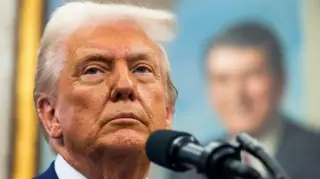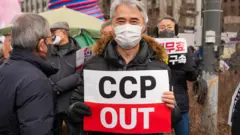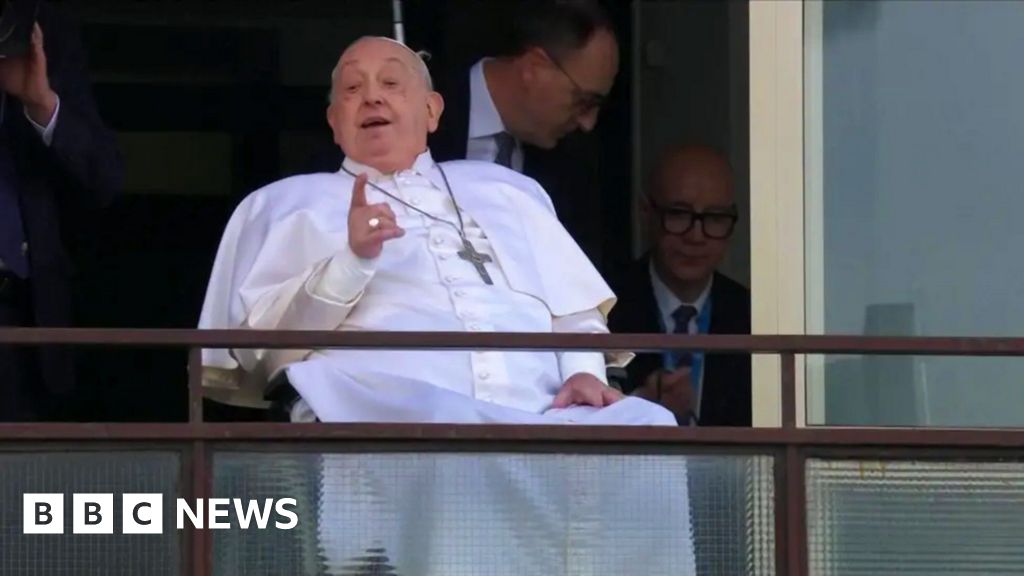BBC News
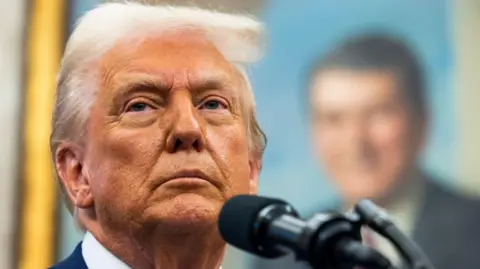 EPA
EPAUS President Donald Trump has said he had a “lengthy and highly productive” phone call with Vladimir Putin on Wednesday in which the leaders agreed to begin negotiations to end the war in Ukraine.
In a post on his Truth Social platform, Trump said he and the Russian president had “agreed to have our respective teams start negotiations immediately” and invited each other to visit their respective capitals.
Later, Ukrainian President Volodymyr Zelensky said he had spoken with Trump about a “lasting, reliable peace”.
The calls with the warring sides came as both Trump and his defence secretary said it was unlikely Ukraine would join Nato, which will come as a bitter disappointment to Kyiv.
Zelensky said he would meet Vice-President JD Vance and Secretary of State Marco Rubio during a defence summit on Ukraine in Munich on Friday.
Trump wrote on social media: “It is time to stop this ridiculous War, where there has been massive, and totally unnecessary, DEATH and DESTRUCTION. God bless the people of Russia and Ukraine!”
He did not set a date for a face-to-face meeting with Putin, but later told reporters at the White House: “We’ll meet in Saudi Arabia.”
Kremlin spokesman Dmitry Peskov said Putin supported Trump’s idea that the time had come to work together.
The phone call between Putin and Trump lasted nearly an hour-and-a-half, during which the Russian president extended an invitation to visit Moscow, Peskov said.
Trump also told reporters at the White House that it was unlikely Ukraine would return to its pre-2014 borders but, in response to a question from the BBC, he said “some of that land will come back”.
The president said he agreed with his Defence Secretary Pete Hegseth, who told a Nato summit earlier on Wednesday that there was no likelihood of Ukraine joining the military alliance.
“I think that’s probably true,” Trump said.
The UK government said it would continue supporting Ukraine’s defence against Russia, with Deputy Prime Minister Angela Rayner telling ITV that London’s backing for Kyiv remained “steadfast”.
In his assessment of the mood in Ukraine’s capital, the BBC’s James Waterhouse says that Hegseth’s speech will have been a body blow for Kyiv.
While it has long been known the new US administration was less sympathetic to Ukraine than its predecessor, our correspondent adds, Hegseth’s every utterance will have probably only pleased Moscow.
There was denial of Nato membership, a view that Ukraine cannot win and ambiguity over how a frozen front line would be policed in the future – all of which added up to a tangible return for Russia’s 11 years of aggression towards Ukraine, our correspondent says.
Zelensky has repeatedly argued there “can be no talks on Ukraine without Ukraine” – but the Trump-Putin phone call took place in his absence.
Zelensky said his call with Trump had been a “good and detailed discussion” about a variety of issues, and that he had also met US Treasury Secretary Scott Bessent, who is visiting Kyiv.
“No one wants peace more than Ukraine. Together with the US, we are charting our next steps to stop Russian aggression and ensure a lasting, reliable peace,” Zelensky wrote.
The Ukrainian leader added: “We agreed to maintain further contact and plan upcoming meetings.”
The call between the US and Ukrainian leaders lasted an hour, according to AFP news agency.
In an interview with The Guardian published on Tuesday, Zelensky suggested that Russian-held territory in Ukraine could be swapped for Ukrainian-held territory in Russia’s western Kursk region as part of a peace deal.
Putin’s spokesman Peskov said this was “impossible”.
“Russia has never discussed and will not discuss the exchange of its territory. Ukrainian units will be expelled from this territory. All who are not destroyed will be expelled.”
Zelensky also insisted that the US, and not just European countries, would need to be part of any security package for his country.
“Security guarantees without America are not real security guarantees,” he said.
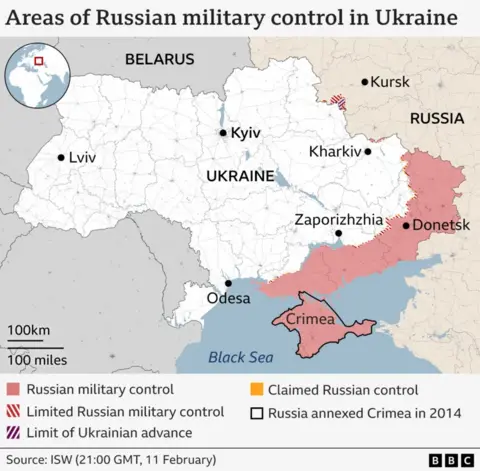
Following the overthrow of Ukraine’s pro-Russian president in 2014, Moscow annexed the Black Sea peninsula of Crimea and backed pro-Russian separatists in bloody fighting in eastern Ukraine.
The conflict burst into all-out war when Russia invaded Ukraine nearly three years ago.
Moscow’s attempts to take control of Kyiv were thwarted, but Russian forces have taken around one-fifth of Ukraine’s territory in the east and south, and have carried out air strikes across the country.
Ukraine has retaliated with artillery and drone strikes, as well as a ground offensive against Russia’s Kursk region.
Accurate casualty counts are hard to come by due to secrecy by both the Russian and Ukrainian governments, but it is estimated that hundreds of thousands of people, most of them soldiers, have been killed or injured, and millions of Ukrainian civilians have fled as refugees.
